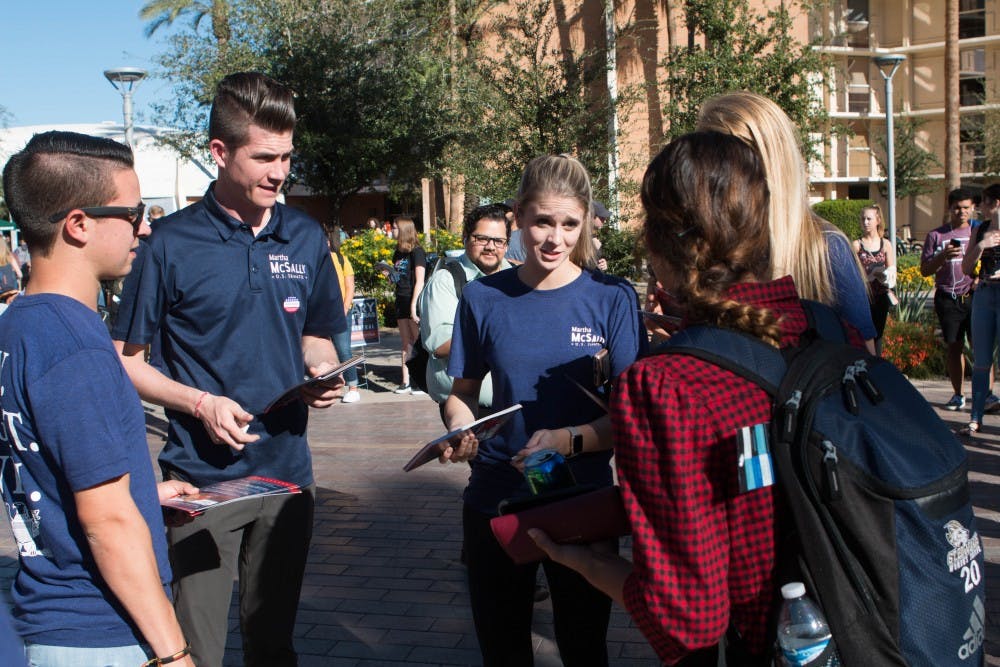A groundswell of Democratic activism carried multiple candidates to wins in tight races in the 2018 midterm election, and also highlighted the inferior public outreach of conservative student groups on campus.
Conservative groups said they maintained an active presence, but some students feel underrepresented as a result of the partisan discrepancy on campus.
According to a memo released by NextGen Arizona, a progressive advocacy organization that focused on youth outreach, "the young Arizonans that NextGen organizers talked to in the field consistently put access to health care, affordable education and immigration reform at the top of their list of political priorities."
During the midterm election, a slew of progressive grassroots efforts took to campus along with NextGen, tabling daily and holding a number of rallies and events. These groups were considerably more visible than conservative groups on campus.
Read more: NextGen Arizona works with ASU students to promote youth voting
Jana Vandenberg, a mathematics sophomore who supported conservative candidates, said she felt underrepresented during the election process, blaming the lapse on both University and state party officials.
“I feel like the Republican Party in general is at fault because they weren’t present at ASU,” she said. “I also think the ASU Republican clubs are at fault because they don’t have more of a presence on campus, but I think the reason for all of this is that the major demographic on college campuses tends to be left.”
Judah Waxelbaum, a sophomore majoring in political science and the president of the Federation of College Republicans, said that the under-representation of conservative students is a problem, but it was only due to the implied bias enshrined in the institution of academia.
“I think that on all college campuses, Republicans have a harder time than Democrats,” Waxelbaum said. “It is much more popular on a college campus to be a public Democrat than a public Republican.”
Overall, he decried the notion that the College Republicans at ASU were not representing the Republican student body.
“It is my belief that College Republicans does a good job at getting students,” Waxelbaum said, “I’m not going to follow the narrative of the idea that they are underrepresented, the organizations are there. They do exist. Whether or not we need to approach new ways of contacting new students, that is something we could look into.”
There are a number of conservative advocacy groups on campus including the College Republicans, College Republicans United and Turning Point ASU, among others.
However, Vandenberg said that having a lot of clubs is not enough and that the existing clubs need to be more vocal.
“I would even go as far as to say that even more groups are hurting the Republicans because it doesn’t show a whole lot of unity – it shows more disagreement,” she said. “Less Democrat groups are able to come together more and be more vocal about that.”
Waxelbaum said that Democrats have recently been better at cohesion in message as of late.
“Politically and nationally, that is something that Democrats have been better than Republicans at for a while now: a unified message,” he said. “Maybe it’s just because Republicans believe in options and the free market, but I think there are only three Democrat-themed clubs if you include NextGen and the Democratic Socialists.”
Other clubs on campus shy away from partisan ideologies and try to look at the broader conversation as an answer to partisan entrenchment.
Josh Fixel, a graduate student majoring in aerospace engineering, is the founder and president of BridgeASU. The organization is nonpartisan and looks to bring students together to share diverse political views.
Fixel said that he thinks that Republican students who feel underrepresented on campus "just haven’t found the right groups or opportunities or locations for them to be able to share their views,” Fixel said.
However, he said it is good to have both partisan and nonpartisan political groups on campus.
“Groups like Bridge that look at all sides of an issue and really look into why people think the way they do and why people have the viewpoint they do is good because it gives students an opportunity to hear all sides of the argument,” Fixel said. “Whereas having these advocacy groups is still good because its a space for students who have figured out that is their view to be able to go and express that view.”
On election day, dozens of Democratic candidates visited the polling location on ASU’s Tempe campus.
One of the only Republicans to make an appearance at the ASU Tempe polling location was Sen. Martha McSally. Vandenberg said that McSally showing up made her feel represented and like she has a voice.
“That is what this election was about for a lot of students," she said. "Whether you were voting Democrat or Republican, it was about your voice mattering.”
Vandenberg echoed the thoughts of Waxelbaum and Fixel that college campuses are predominantly liberal leaning.
“It still builds a kind of anxiety for people who might want to voice their opinions,” she said. “If you are a Republican, you keep your head low, keep your mouth quiet and keep it into the context of friends and political science classes.”
Waxelbaum said Republicans should know that they are not alone.
“Be vocal about it because if we stay silent, we assume we are the minority. I know we lost the House, but the gains we gained over the last few years (would not be) possible by simply being the minority in this country,” Waxelbaum said.
Editor's note: Jana Vandenberg is a previous arts and culture reporter for The State Press.
Reach the reporter at isaac.windes@asu.edu or follow @isaacdwindes on Twitter.
Like The State Press on Facebook and follow @statepress on Twitter.




